
Letter from an Unknown Woman is a novella by Stefan Zweig. Published in 1922, it tells the story of an author who, while reading a letter written by a woman he does not remember, gets glimpses into her life story.

Stefan Zweig was an Austrian writer. At the height of his literary career, in the 1920s and 1930s, he was one of the most widely translated and popular writers in the world.

Moses Joseph Roth was an Austrian-Jewish journalist and novelist, best known for his family saga Radetzky March (1932), about the decline and fall of the Austro-Hungarian Empire, his novel of Jewish life Job (1930) and his seminal essay "Juden auf Wanderschaft", a fragmented account of the Jewish migrations from eastern to western Europe in the aftermath of World War I and the Russian Revolution. In the 21st century, publications in English of Radetzky March and of collections of his journalism from Berlin and Paris created a revival of interest in Roth.
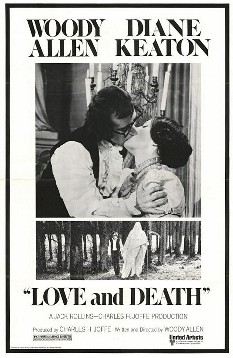
Love and Death is a 1975 American comedy film written and directed by Woody Allen. It is a satire on Russian literature starring Allen and Diane Keaton as Boris and Sonja, Russians living during the Napoleonic Era who engage in mock-serious philosophical debates. Allen considered it the funniest film he had made up until that point.
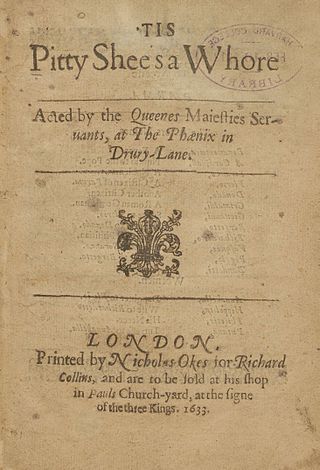
'Tis Pity She's a Whore is a tragedy written by John Ford. It was first performed c. 1626 or between 1629 and 1633, by Queen Henrietta's Men at the Cockpit Theatre. The play was first published in 1633, in a quarto printed by Nicholas Okes for the bookseller Richard Collins. Ford dedicated the play to John Mordaunt, 1st Earl of Peterborough and Baron of Turvey.

Édouard Molinaro was a French film director and screenwriter.

Maria Schrader is a German actress, screenwriter, and director. She directed the award-winning 2007 film Love Life and the 2020 Netflix miniseries Unorthodox, for which she won the Primetime Emmy Award for Outstanding Directing for a Limited Series. She also starred in the German international hit TV series Deutschland 83 (2015), known for being the first German-language series broadcast on US television.
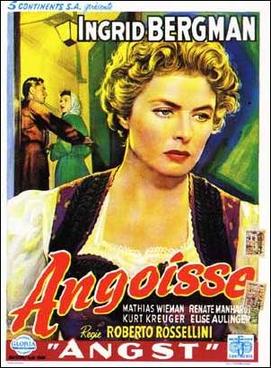
Fear is a 1954 German-Italian drama film directed by Roberto Rossellini and starring his wife Ingrid Bergman. It is loosely based on the Stefan Zweig novella Fear. Rossellini created it because he wanted to explore the reconstruction of Germany from both a material and moral standpoint ten years after making his previous German film Germany, Year Zero. The film is noirish with aspects reminiscent of Hitchcock and German Expressionism.
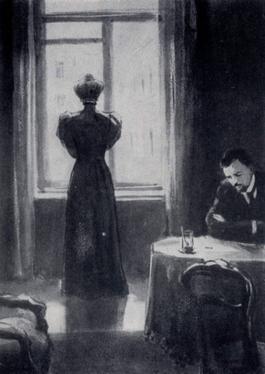
"The Lady with the Dog" is a short story by Anton Chekhov. First published in 1899, it describes an adulterous affair between an unhappily married Moscow banker and a young married woman that begins while both are vacationing alone in Yalta. It is one of Chekhov's most famous pieces of short fiction, and Vladimir Nabokov considered it to be one of the greatest short stories ever written.

Letter from an Unknown Woman is a 1948 American drama romance film released by Universal-International and directed by Max Ophüls. It was based on the novella of the same name by Stefan Zweig. The film stars Joan Fontaine, Louis Jourdan, Mady Christians, and Marcel Journet (actor).

Stolen Holiday is a 1937 film directed by Michael Curtiz and starring Kay Francis, Claude Rains and Ian Hunter. It is loosely based on the Stavisky Affair, a French political scandal. A Russian con artist worms his way into the upper reaches of French society, but is finally exposed, with tragic consequences.

24 Hours in the Life of a Woman is a 1968 French-West German drama film directed by Dominique Delouche, based on the novella Twenty-Four Hours in the Life of a Woman by Stefan Zweig. It was listed to compete at the 1968 Cannes Film Festival, but the festival was cancelled due to the events of May 1968 in France. The book on which the film is based had previously been adapted as 24 Hours of a Woman's Life in 1952, and was later adapted as 24 Hours in the Life of a Woman in 2002.

Beware of Pity is a 1946 British romantic drama film directed by Maurice Elvey and starring Lilli Palmer, Albert Lieven and Cedric Hardwicke. It is based on the novel of the same name by Stefan Zweig. A paraplegic young baroness mistakes compassion for love. The film's costumes were designed by Cecil Beaton. It was made by Two Cities Films at Islington Studios. The film was not a great popular success outside the Soviet Union.
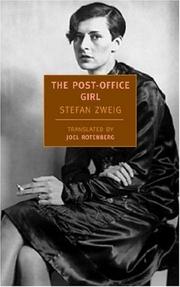
The Post Office Girl is a novel by the Austrian writer Stefan Zweig. It tells the story of Christine Hoflehner, a female post-office clerk in a small town near Vienna, Austria-Hungary, during the poverty-stricken years following World War I. The book was published posthumously in 1982.

Fear is a 1925 novella by the Austrian writer Stefan Zweig. It was adapted into a 1928 silent film, Angst, directed by Hans Steinhoff, a 1936 film, La Peur, directed by Victor Tourjansky, and a 1954 film, Fear, directed by Roberto Rossellini.
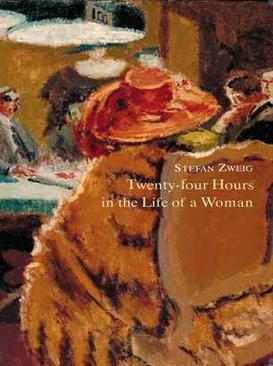
Twenty-Four Hours in the Life of a Woman is a 1927 novella by the Austrian writer Stefan Zweig. It was filmed in 1931, 1944, 1952, 1968, and 2002. A television movie was telecast in 1961 starring Ingrid Bergman and Rip Torn.

24 Hours of a Woman's Life, also known as Affair in Monte Carlo, is a 1952 British romantic drama film directed by Victor Saville and starring Merle Oberon, Richard Todd and Leo Genn. It is loosely based on the novella by Stefan Zweig. Produced by ABPC, it was shot at the company's Elstree Studios and on location in Monaco. The film's sets were designed by the art director Terence Verity.
Anna Fleischle is a theatre designer who has worked in theatre, dance and opera.
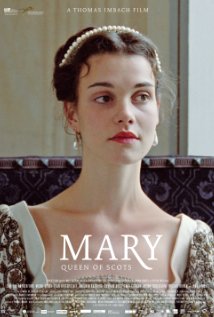
Mary Queen of Scots is a 2013 Swiss period drama directed by Thomas Imbach. It is his first film in the English and French languages, starring the bilingual French actress Camille Rutherford. The film portrays the inner life of Mary, the Queen of Scotland. The film is based on the Austrian novelist Stefan Zweig's 1935 biography, Mary Stuart, a long-term bestseller in Germany and France but out of print in the UK and the US for decades until 2010. The film was first screened at the 2013 International Film Festival Locarno and was later shown at the 2013 Toronto International Film Festival.

Friderike Maria Zweig was an Austrian writer.



















